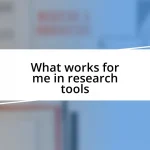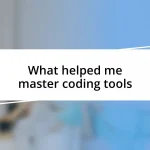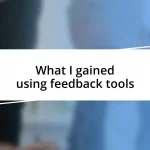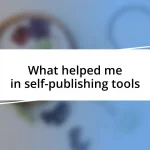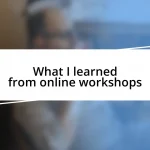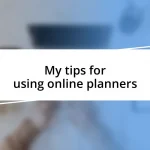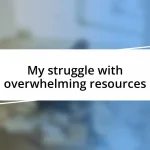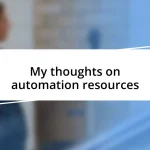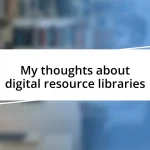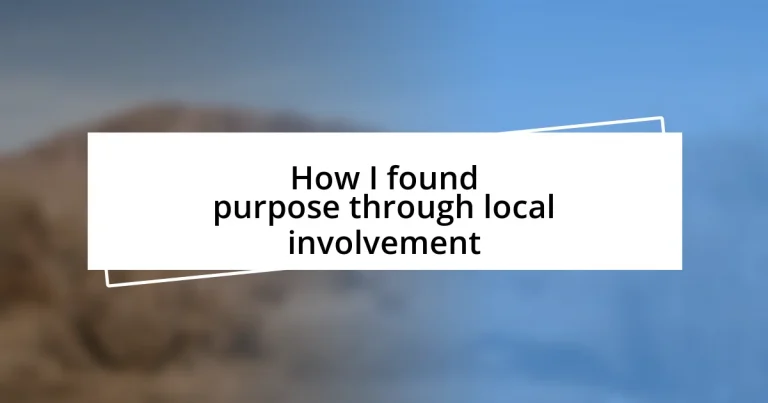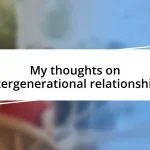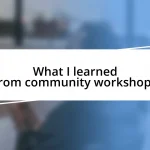Key takeaways:
- Understanding personal purpose involves introspection and embracing vulnerability, leading to connections with community and passion for helping others.
- Engaging with local organizations creates a sense of belonging and inspires collective action, demonstrating the impact of advocacy alongside volunteering.
- Volunteering not only fosters community change but also facilitates personal growth, cultivating resilience, empathy, and meaningful relationships.
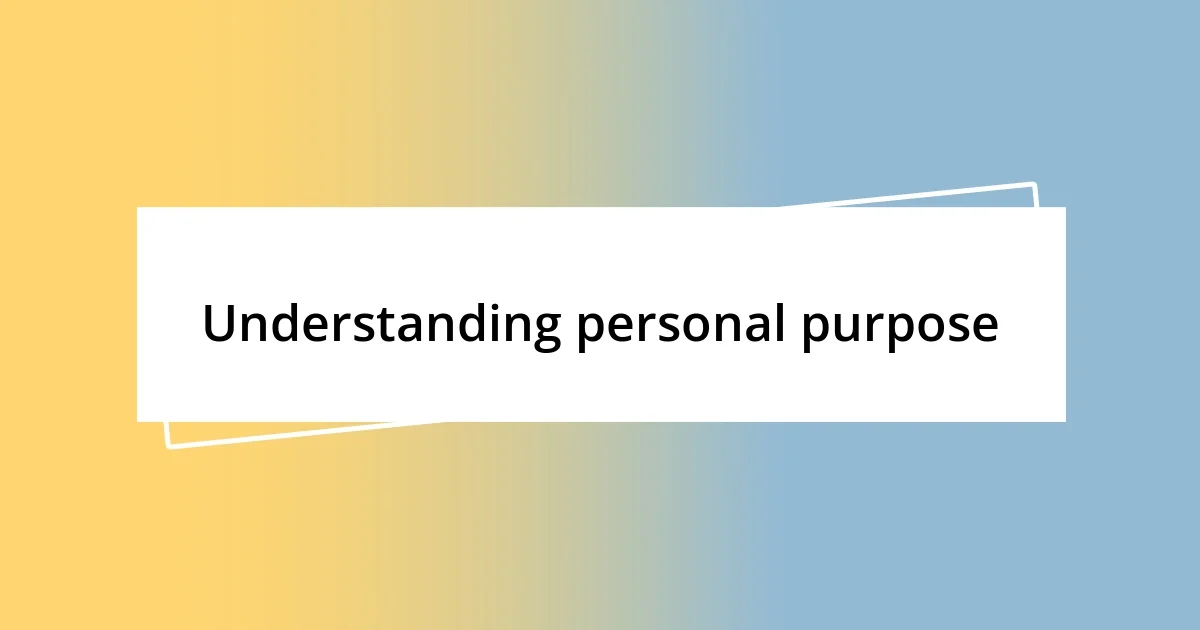
Understanding personal purpose
Understanding personal purpose is often a deeply introspective journey. I remember the moment I started to question what truly mattered to me—was I simply going through the motions, or was there something deeper guiding my actions? It’s humbling to realize that our sense of purpose can evolve; what gives meaning to our lives can change as we grow and deepen our experiences.
Reflecting on my own path, I’ve found that purpose is intertwined with passion and community. One day, while volunteering at a local food bank, I felt a rush of fulfillment as I helped distribute meals to families in need. In that moment, I understood that my purpose wasn’t just about personal success but also about making a difference in the lives of others. How often do we consider that our deepest motivations might lie in the connections we foster within our communities?
Furthermore, I’ve learned that understanding personal purpose requires vulnerability and honesty with oneself. When I confronted my fears and insecurities, I realized that embracing my true self was a key step toward clarity. Have you ever paused to think about what truly pushes you forward? Finding purpose means asking those tough questions and being open to whatever answers emerge from within.
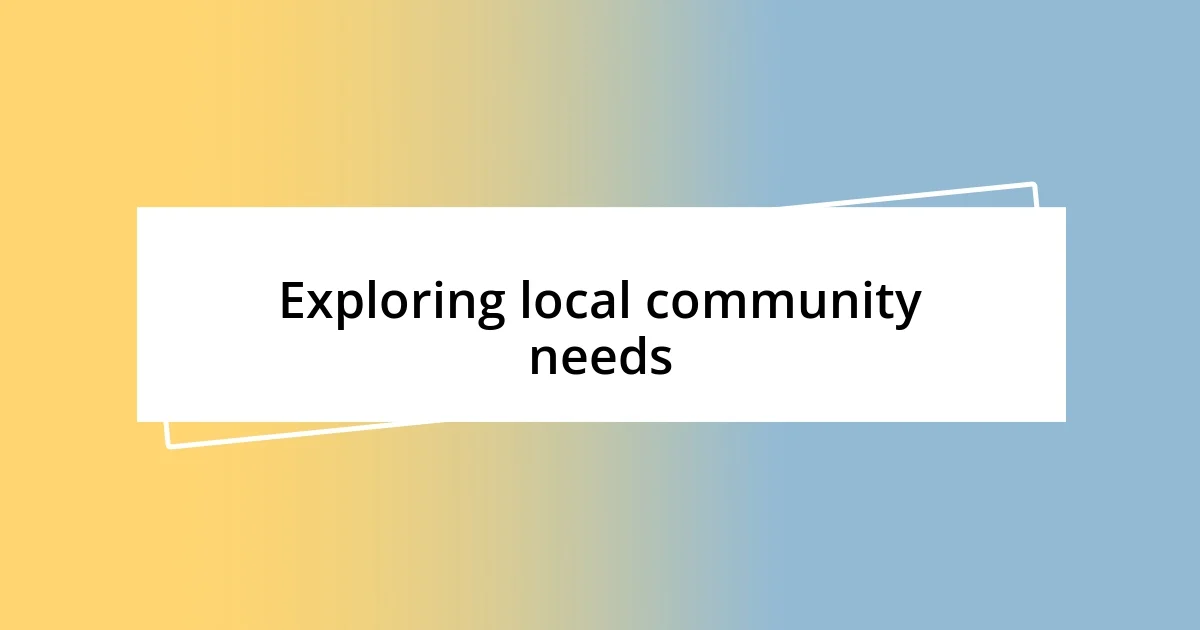
Exploring local community needs
Exploring local community needs has been such a revealing experience for me. I recall walking through my neighborhood one day, noticing the neglected park where kids would play just a few years ago. Seeing the lack of resources sparked a desire in me to reach out. It’s honestly eye-opening to see how many small issues could change a community if we just paid attention and connected with local leaders.
I often find that community needs go beyond mere physical resources. During a discussion at a town hall meeting, I listened to parents expressing their concerns about after-school programs lacking funding. The emotional weight of their stories truly moved me. It made me realize that advocacy is just as important as volunteering; our voices can create significant change. Have you ever reflected on how your local community could benefit from proactive involvement?
In my experience, addressing local needs starts with a simple question: What do people desire? I remember collaborating with a group to conduct surveys, gathering input from residents about their priorities—whether it was health services, better transportation, or educational opportunities. The results were illuminating. In uncovering these needs, I found a sense of belonging and purpose that I hadn’t expected.
| Common Community Needs | Ways to Address Them |
|---|---|
| Access to Healthy Food | Community Gardens, Food Drives |
| Safe Recreational Areas | Neighborhood Clean-up Events |
| Educational Resources | Local Workshops, Tutoring Programs |
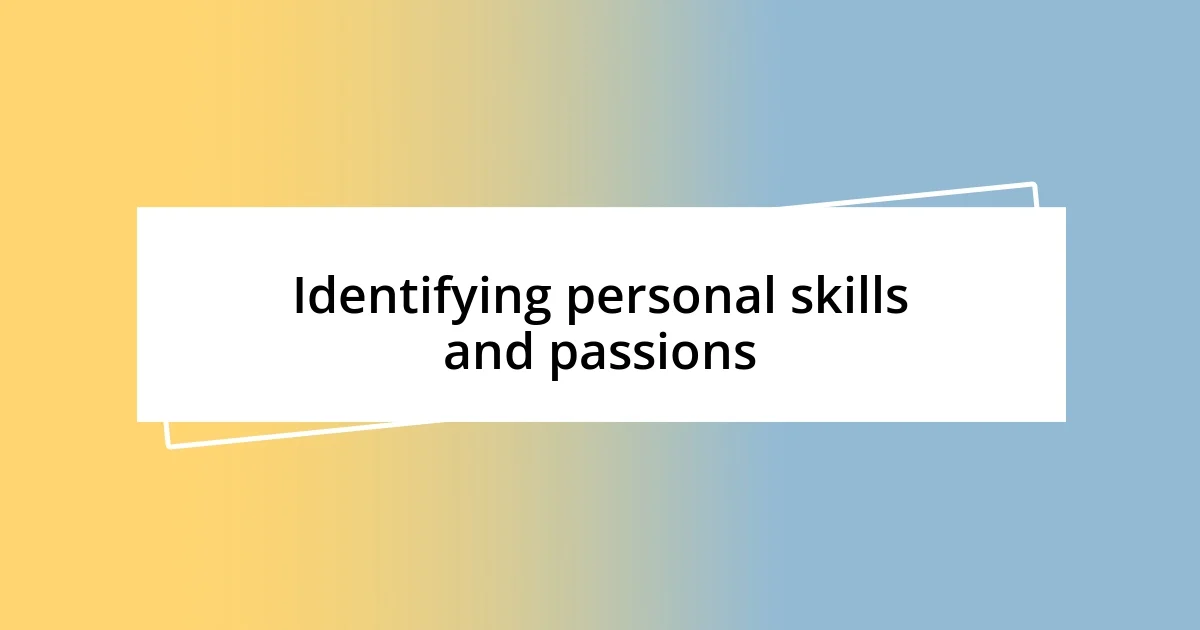
Identifying personal skills and passions
Identifying personal skills and passions is a transformative step toward finding purpose. In my journey, I discovered that taking time to reflect on what I excel at—and what brings me joy—opened doors I hadn’t even considered. Just the other day, while helping a friend organize a charity art event, I realized how much I enjoyed planning and connecting artists with the community. It was more than just organizing; it felt like a beautiful way to weave together my love for art and my passion for community engagement.
To help you identify your own skills and passions, consider these questions:
- What activities make you lose track of time?
- When did you last feel completely fulfilled?
- What compliments or feedback have you received most from others?
- What subjects ignite your curiosity or make you want to learn more?
- In what ways have you helped others that brought you joy?
These reflections are more than just exercises; they’re ways to hear your inner voice. I remember the moment I finally articulated my passion for storytelling—it was liberating. It’s an exploration that requires patience, but trust me, the discoveries can be profoundly rewarding.
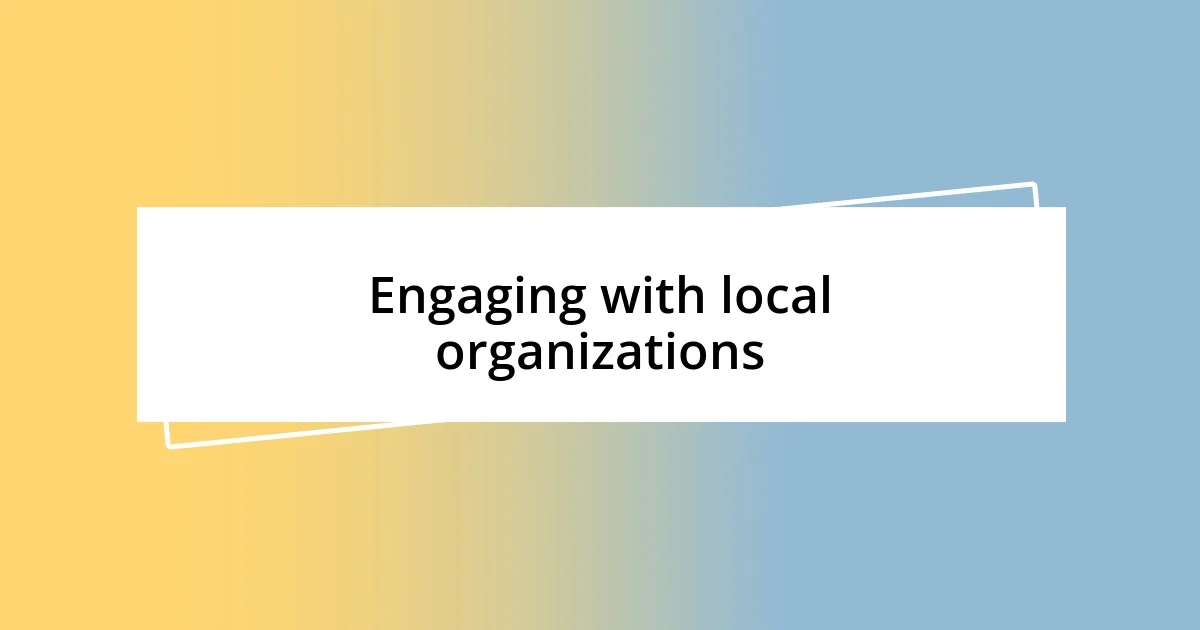
Engaging with local organizations
Engaging with local organizations has been a game changer for me. I remember attending my first community meeting with a local nonprofit. As I listened to volunteers share their stories, I could feel my heart swell with excitement. It dawned on me how these organizations are often the heartbeat of the community, addressing needs and rallying support in ways I had previously overlooked.
Just last month, I volunteered with a local group focused on youth mentorship. Working alongside seasoned mentors opened my eyes to the impact these organizations have on shaping young lives. I was struck by the camaraderie among volunteers; it felt like being part of a family dedicated to a common cause. Have you ever experienced that sense of belonging when contributing to something greater than yourself?
Every time I’ve engaged with a local organization, I’ve left feeling inspired. One particular moment stands out—a fundraising event where I got to share stories of our young mentors with attendees. Seeing their faces light up with understanding and empathy was unforgettable. It made me realize the power of storytelling in fostering connections and driving community involvement. How often do we underestimate the potential of our local organizations to create waves of positive change?
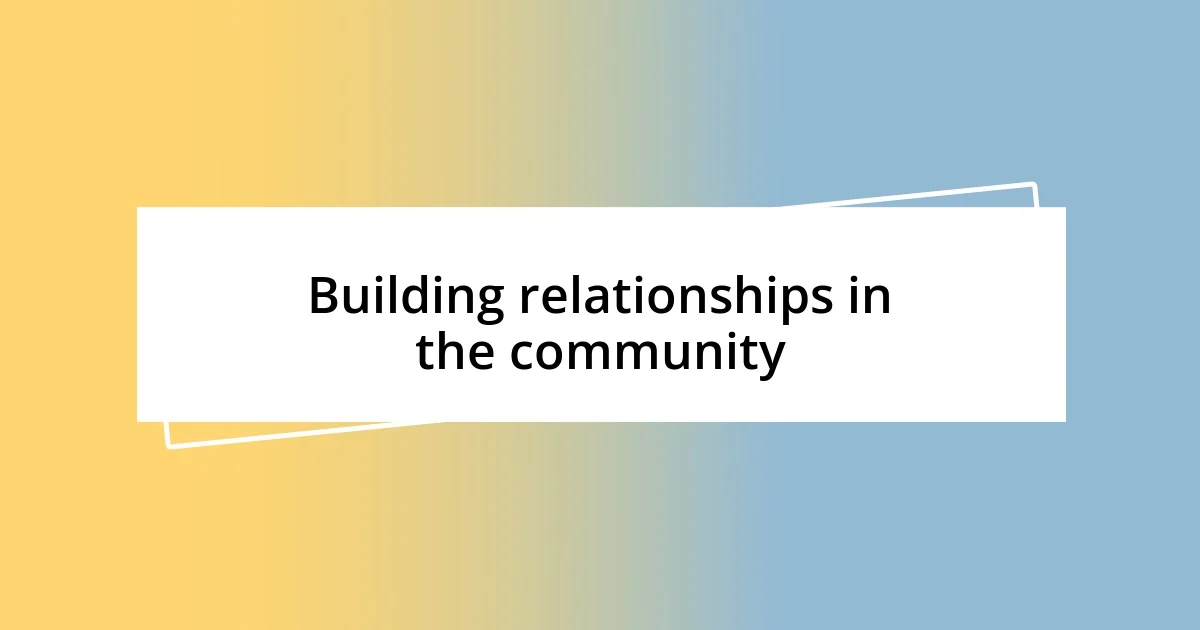
Building relationships in the community
Building relationships within a community requires an open heart and a willingness to connect. I once volunteered at a neighborhood festival, where I met a woman who had lived in the area for decades. As we shared stories while setting up booths, I realized how these small interactions could create lasting bonds. Have you ever noticed how a simple conversation can break down barriers and foster trust?
In another instance, I joined a community gardening project. At first, it felt intimidating, but the moment I teamed up with a few locals to plant flowers, I felt an incredible energy. We laughed, exchanged gardening tips, and our conversations naturally flowed into deeper discussions about our lives. That day taught me that shared activities often pave the way for meaningful connections. Isn’t it fascinating how working towards a common goal can unite people from different backgrounds?
Reflecting on these experiences, I see that the connections we build in our community are not merely social ties; they enhance our emotional well-being. Just last week, I ran into one of those festival volunteers at a coffee shop. We chatted about our upcoming events, and that simple reunion sparked plans for further collaboration. It made me ponder one thing: how can we constantly encourage such organic relationships in our neighborhoods?
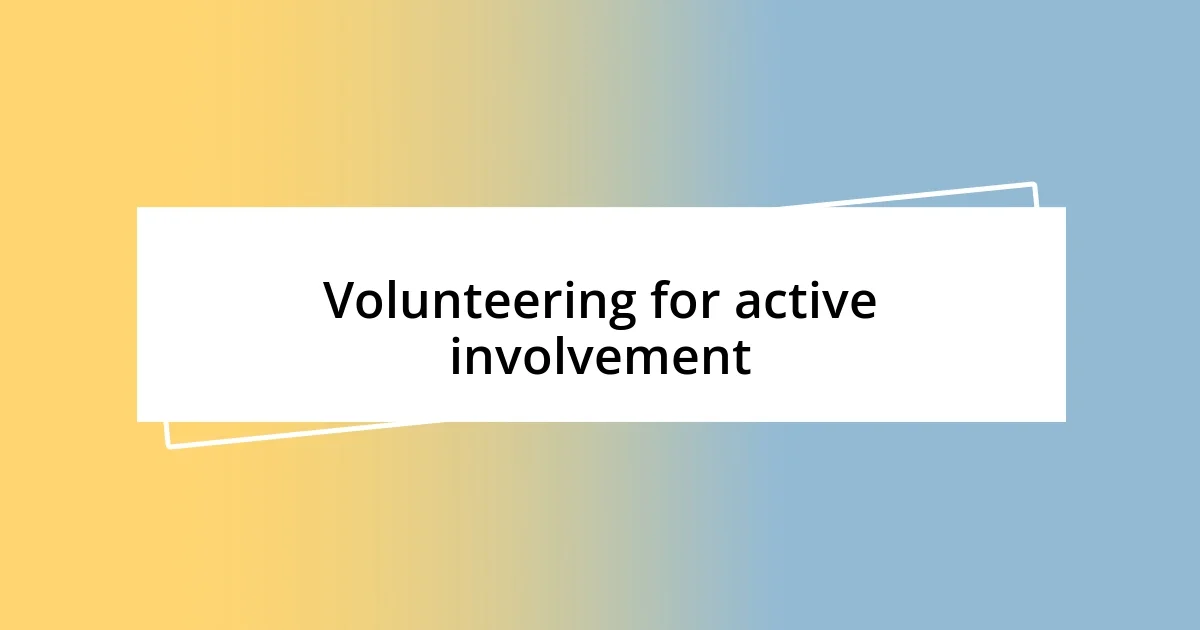
Volunteering for active involvement
Volunteering is an incredible avenue for active involvement in your community. I remember my first experience volunteering at a local food bank. The sheer volume of people who rely on these services struck me deeply. Helping to organize food distributions not only allowed me to contribute but also connected me with fellow volunteers who shared similar passions. Have you ever felt that rush when you know you’ve made someone’s day a little brighter?
Through volunteering, I’ve discovered that meaningful change often starts with a single action. During one particular weekend spent cleaning up a local park, I struck up a conversation with a retiree who had lived in the area for years. She shared stories of how the park transformed over time, making me appreciate our responsibilities as caretakers of shared spaces. It made me wonder—how much history do we carry within our community, and what can we learn from those who’ve witnessed its evolution?
In these moments, I found that volunteering isn’t just about giving; it’s about receiving invaluable insights and relationships too. I once participated in a workshop run by a nonprofit focused on mental health awareness. As we discussed various strategies to reach vulnerable groups, I realized how vital these discussions are for fostering a supportive environment. Isn’t it incredible how volunteering can spark conversations that break down stigmas? Engaging directly with community challenges can not only fuel my purpose but also empower others to join the movement for change.
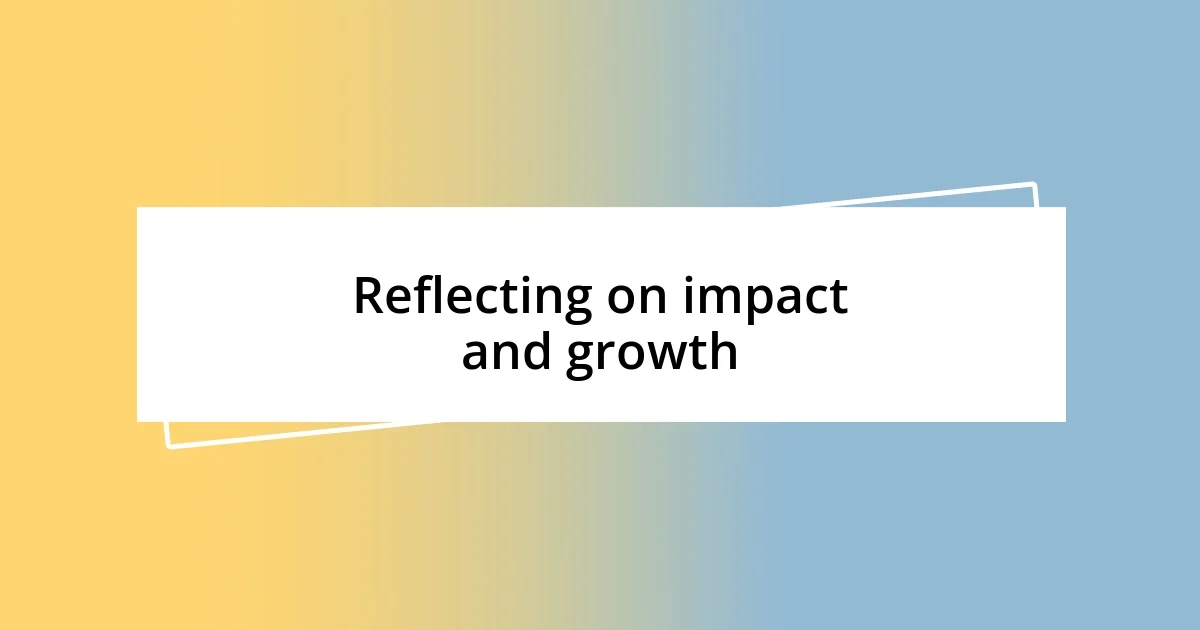
Reflecting on impact and growth
Reflecting on my journey of local involvement, I often find myself amazed at the profound impact these experiences have had on my growth. I recall a time when I helped organize a community clean-up. Initially, it felt like just another task on my checklist, but as the day progressed, I witnessed firsthand the transformation of not just the park, but also the relationships forming among the volunteers. It made me wonder: how often do we underestimate the power of a shared mission to ignite change and foster unity?
Every encounter deepens my understanding of my community’s needs and my role within it. For example, during a recent neighborhood meeting, we discussed local safety concerns. It struck me how my simple act of listening became a catalyst for others to voice their own experiences, turning the conversation into a collective action plan. Reflecting on moments like these, I realize that vulnerability can become a strength. Doesn’t it feel rewarding when one person’s courage inspires others to join the conversation?
Looking back, I see growth tied intricately to these experiences. Each volunteer opportunity has taught me the significance of resilience and empathy. I remember a poignant moment when I comforted a young family who had just lost their home in a fire. That experience broke my heart but opened my eyes to the strength of community support. It makes me reflect on how, through helping others, I’ve been shaped into a more compassionate person. How can we use such experiences to further our collective mission of nurturing empathy and resilience in our neighborhoods?
